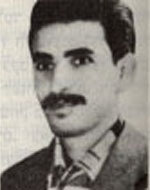Ben-Lulu, Nissim
Nissim, son of Zohra and Eliahu, was born in 1937 in Marrakech, Morocco, where he did not receive a proper education in his home country, and from an early age he began to prepare for his future career. He was a skinny, shy child, who did not talk much and was very rude, and he was aware of the difficulties of earning a living that his parents encountered and knew that he had to acquire a profession that would ensure his existence. He was diligent, endowed with perseverance and good, quick hands When he saw that he was doing well, he married Phoebe and immigrated to Israel in 1957. He chose to settle in Mevasseret Yerushalayim on the outskirts of Jerusalem, because he was a craftsman He was hired by the Jerusalem Shoes factory in the Romema industrial zone, and Nissim was drafted into the IDF at the beginning of 1959, less than two years after his arrival in Israel, and was assigned to the infantry. After completing basic training, he underwent mortar training courses and was assigned to one of the field units. At the end of his regular service he was released and moved to serve in a special reserve unit for the vital people in their workplaces in their civilian lives. Following his employer’s request at the Jerusalem Shoes factory, Nissim was placed in a “confinement” unit, whose members are called for reserve duty. In Israel, the family had five children, one after the other. First the daughter, Batya, was born in 1959. Then Ruth, David, Orly and me. Nissim was well integrated into his work, professionally and socially. His calm temperament and good nature brought him closer to his co-workers and to many of his close connections. Nissim did not participate in quarrels and provocations and distanced himself from people who were known to be derogatory. So he won the trust of his coworkers and the affection of his employers, and everyone loved him and asked for his friendship. During the Yom Kippur War, Nissim participated in the difficult battles in Sinai. He was one of the defenders of the “Oracle” outpost on the Suez Canal. On the afternoon of October 7, 1973, in the afternoon, an order was received to withdraw from the post. The squad with whom Nissim retreated was ambushed by Egyptian soldiers and in the exchange of fire he was killed. He was brought to eternal rest in the cemetery on Mount Herzl. He left behind a wife and five children. After his fall, he was promoted to corporal.
